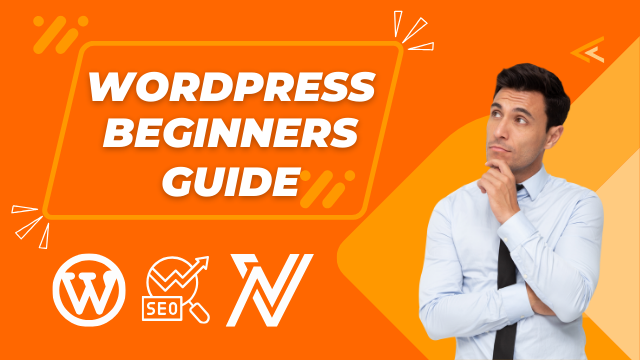What is WordPress:
WordPress has revolutionized the way websites are created, making it accessible to individuals with varying levels of technical expertise. In this guide, we’ll delve into the world of WordPress, exploring its features, how beginners can leverage it for website building, and how to turn that knowledge into freelance income opportunities. Additionally, we’ll address common FAQs, such as the job prospects with WordPress, the need for HTML skills, the learning curve, and the cost of using WordPress.
Table of Contents
1. Understanding WordPress: An Overview:
WordPress is a powerful content management system (CMS) that allows users to create, customize, and manage websites without extensive coding knowledge. Originally designed for blogging, it has evolved into a versatile platform used by millions for various purposes, including blogs, portfolios, business sites, and e-commerce.
2. Getting Started with WordPress: A Step-by-Step Guide:
- Setting Up Hosting and Domain:
- Choose a reliable hosting provider. Hostinger, BlueHost, and GoDaddy are excellent options with budget-friendly pricing.
- Register a domain name that reflects your website’s purpose.
- Installing WordPress:
- Most hosting providers offer a one-click installation for WordPress.
- Follow the installation prompts, and within minutes, your WordPress site will be ready.
- Choosing a Theme:
- Explore the vast array of free and premium themes available.
- Select a theme that aligns with your website’s goals and aesthetics.

- Adding Content:
- Use the intuitive WordPress editor to create pages and posts.
- Incorporate multimedia elements, such as images and videos, to enhance your content.
3. Earning Freelance Income with WordPress:

- Building Your Portfolio:
- Create a portfolio website showcasing your WordPress skills.
- Highlight projects that demonstrate your ability to customize and optimize WordPress sites.
- Joining Freelance Platforms:
- Sign up on popular freelance platforms like Upwork, Fiverr, or Freelancer.
- Create a compelling profile, emphasizing your expertise in WordPress.
- Bidding on Projects:
- Browse job listings for WordPress-related projects.
- Craft personalized proposals showcasing your skills and experience.
- Delivering Quality Work:
- Communicate effectively with clients to understand their requirements.
- Deliver well-designed, functional websites on time.
- Expanding Your Skills:
- Stay updated on WordPress updates and trends.
- Consider learning additional skills like SEO, e-commerce integration, or plugin development.
4. FAQs About WordPress:
- Can WordPress Get You a Job? WordPress skills are in high demand, and many businesses seek professionals who can create and manage WordPress sites. It can lead to job opportunities in web development, digital marketing, and content creation.
- Do You Need to Know HTML for WordPress? While basic HTML knowledge can be beneficial, it’s not a strict requirement. WordPress provides an intuitive visual editor, and many tasks can be accomplished without coding. However, understanding HTML can enhance your ability to customize and troubleshoot.
- How Hard Is It to Learn WordPress? WordPress is designed to be user-friendly, and many beginners find it relatively easy to learn. With online tutorials, forums, and the vast WordPress community, you can quickly become proficient.
- Is WordPress Free? Yes, WordPress itself is free and open-source. However, you may need to pay for a domain, hosting, premium themes, and plugins. The overall cost depends on your specific needs and goals.
- Can I Use WordPress for E-commerce? Yes, WordPress is highly suitable for e-commerce. You can integrate plugins like WooCommerce to transform your website into a fully functional online store.
- What Are Plugins, and Do I Need Them? Plugins are extensions that add specific features and functionalities to your WordPress site. While you don’t need them for basic functionality, plugins can enhance your site’s capabilities. It’s essential to choose reputable plugins and only install those you genuinely need to avoid performance issues.
- Is WordPress Only for Blogging? While WordPress started as a blogging platform, it has evolved into a versatile CMS capable of supporting various types of websites. You can create business websites, portfolios, online stores, forums, and more.
- How Do I Ensure WordPress Security? WordPress is secure, but like any platform, it can be vulnerable if not properly maintained. Follow security best practices, such as keeping themes and plugins updated, using strong passwords, and employing a reliable security plugin.
- Can I Monetize My WordPress Site? Absolutely. You can monetize your WordPress site through various means, including displaying ads, affiliate marketing, selling products or services, sponsored content, and membership subscriptions.
- What’s the Difference Between WordPress.com and WordPress.org? WordPress.com is a hosted solution where your site is hosted on WordPress servers, and they handle maintenance. WordPress.org provides the open-source software that you can download and install on your chosen hosting provider. The latter offers more flexibility and control but requires more responsibility for maintenance.
- Do I Need Coding Skills to Use WordPress? No, coding skills are not necessary to use WordPress. The platform provides a user-friendly interface, and many tasks can be accomplished without coding. However, having a basic understanding of HTML and CSS can empower you to make more advanced customizations.
- How Can I Improve WordPress Website Speed? Website speed is crucial for user experience and SEO. Optimize your images, use a caching plugin, choose a reliable hosting provider, and consider a content delivery network (CDN) to improve your WordPress site’s speed.
- What is SEO? SEO, or Search Engine Optimization, is the practice of optimizing online content to improve its visibility and ranking in search engine results, thereby increasing organic (non-paid) traffic to a website or webpage.
- Is WordPress SEO-Friendly? Yes, WordPress is inherently SEO-friendly. However, you can enhance its SEO by using SEO plugins like Yoast SEO or All in One SEO Pack. These plugins help you optimize content, meta tags, and other essential elements for better search engine rankings.
- Can I Move My Website from WordPress.com to WordPress.org? Yes, it is possible to migrate your website from WordPress.com to WordPress.org. This process involves exporting your content from WordPress.com and importing it into a self-hosted WordPress.org site. The move provides more control and flexibility over your website.
Conclusion:
WordPress is not just a website-building tool; it’s a gateway to a world of possibilities for both beginners and seasoned professionals. Whether you aim to create your website or embark on a freelance career, understanding WordPress is a valuable skill that can open doors to countless opportunities. From building your portfolio to exploring job prospects, WordPress empowers you to shape your digital future. Happy exploring!
Explore additional online money-making methods in the article below:
Top 10 Ways to Make Money Online in 2024
For comments and suggestions, reach out to us at Contact Page. Thanks for reading!





